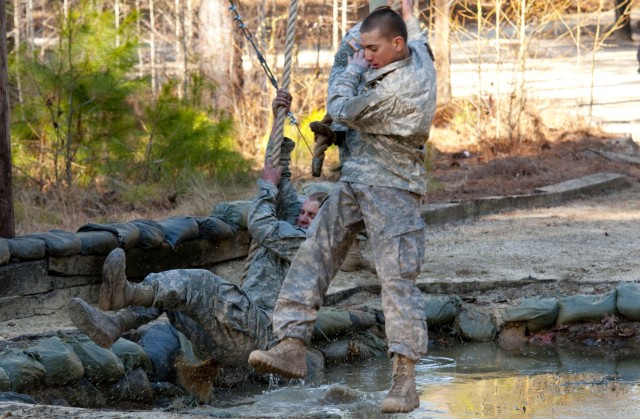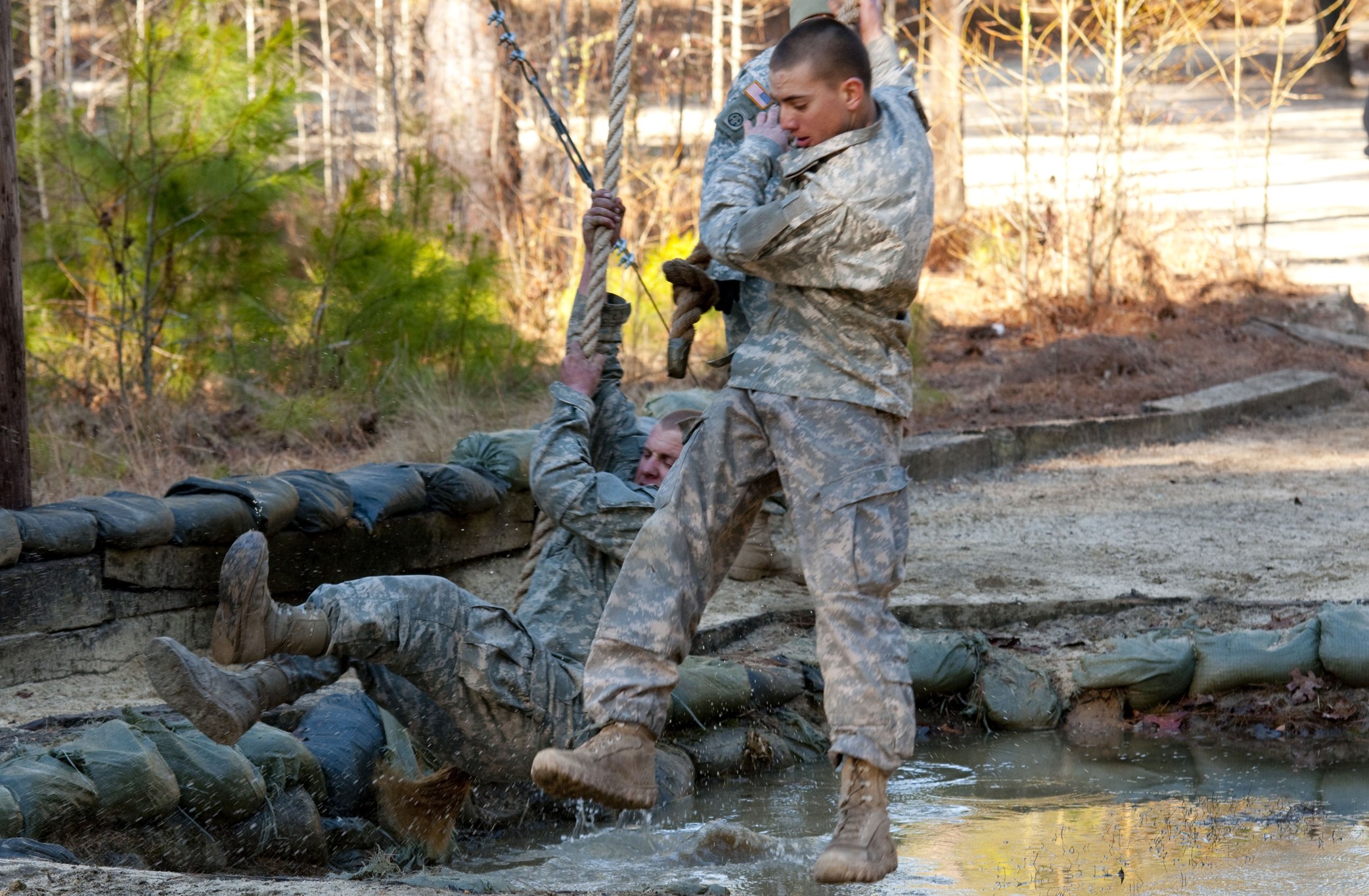
FORT BRAGG, N.C. - Location: 82nd Airborne Division Pre-Ranger Training Course, the middle of nowhere (e.g. tucked into the woods off West Manchester Road, Fort Bragg)
Date: Feb. 15.
Time: 10:02 a.m.
Skies: sunny.
You've squatted until you can't stand straight. Everything aches. Twenty minutes into the workout, you're still getting smoked. Some paratrooper, who can't cut it, is doing bear crawls in the sand. You thought 100 side straddle hops was the cutoff, but the cadre continues counting. The group halts only to change direction, then it's down on the ground, aching from flutter kicks. And glancing at the 28-station obstacle course to the right, your only thought is, we haven't even begun.
"Here we push them to the edge ... and then once they're broke down, once they let the system work for them, most likely they're going to push past that (desire to cave)," said Sgt. 1st Class David Forbes, Pre-Ranger instructor.
Forbes and 11 other instructors run the top-ranked Pre-Ranger Course in the Army. Eighty-eight to 90 percent of Soldiers who graduate Fort Bragg's Pre-Ranger Course go on to secure their Ranger tabs. Competition is tough, though, and a Soldier's greatest obstacle to graduation is often himself. Of the 55 candidates who joined the Pre-Ranger ranks on Jan. 31, only nine emerged successful after 17 days.
"You'll see a huge change in almost every single person that comes out here," said Staff Sgt. Christopher Barthelme, an instructor with the course for seven months. "It's either one of two things - they go from being very motivated on day one, to the end where they're like, 'Oh, I hate my life.' Or the reverse of it, where you have a Soldier who's not motivated to be here (maybe his chain of command sent him), and then somewhere within those 17 days, they find out this course is for them. They release themselves and say, I'm going to let (the cadre) do what they've got to do and learn what I can'," added Barthelme.
For candidates, there's a risky balance between checking your ego at the door and harnessing the confidence to continue. Just to enter PRC, a Soldier must score 80 percent on his Army physical fitness test. Then it's the day-to-day exhaustion of physical exercise, a 5-mile run, a 12-mile road march within three hours, a strenuous obstacle course; along with performance tests like land navigation and classroom instruction. The top four classes - ambush, recon, warning order and operations order - can trip up troops, causing some to voluntarily withdraw.
Each candidate must pass the Big Five events: land nav, a road march, PT test, obstacle course, and a five-mile run to keep alive the slim chance of Ranger selection. PRC also takes a physical toll on the body. From back problems to sprained ankles to knees going out, Soldiers are pained by the massive loads they carry.
Barthelme, who graduated Ranger school with a hyper-extended knee, said that only 15 percent of candidates drop the course for medical reasons.
"Almost everyone who graduates PRC and Ranger school is dealing with some major illness or injury when they graduate. That's part of the course that you've got to learn - if it's not going to hurt your body any more, you have to push through that pain," he added.
And what about the Pre-Ranger Obstacle Course' It's like your childhood playground on steroids. Anyone who steps onto this course knows that the 'dust yourself off and try again' attitude of elementary school is a thing of the past. Here you want to get it right and get it right the first time, because every mistake adds another minute to an already grueling workout.
But physically fit Soldiers must also prove themselves in the leadership department. According to Barthelme, the cadre looks for inherent leadership qualities like self-sacrifice, when determining who graduates to the next level. It can be as simple as ensuring others eat first, or allowing another guy to fill up his canteen when time is short. A selfish Soldier sticks out like a sore thumb, said Barthelme. On the flip side, a true leader will always emerge when tested to the limits.
As a former squad leader, seasoned by three Iraq deployments and a Haitian operation, Barthelme said, "I look for someone who's going to take care of his Soldiers, because if you take care of your Soldiers they're going to work harder for you."
Barthelme and Forbes listed Candidate #13, who graduated the course from Womack Army Medical Center due to a physical injury, as a prime example of a true leader. Forbes said, "He had a lot riding on (this course). As a staff sergeant coming through, in order to keep his position in the unit he had to come and graduate."
What began as a battle of wills, turned around after the first two days. Doing the right thing, refusing to take the easy path and setting an example for the other Soldiers helped the candidate earn his cadre's respect.
Instructors adopt their own leadership styles, too. Basic leadership, according to Forbes, means making decisions and motivating your paratrooper when everyone else is cold, wet and tired.
"Soldiers might respond to someone who yells or they might respond to someone who actually talks to them in a lower tone," said Forbes.
When it comes to being "the best in Army," cadre and candidates strive to stay ahead of the curve. Thanks to Soldier feedback, PRC has adopted lower student-to-trainer ratios and more land nav preparation (five land nav tests, including a buddy team exercise), among other improvements. With 11, 17-day courses throughout the year, this means PRC is in a constant state of innovation. It's all worth it, according to Forbes, when a Soldier walks back through that door with his Ranger tab.
"You see a full circle of them understanding why we're so hard on them here," he explained.

Social Sharing